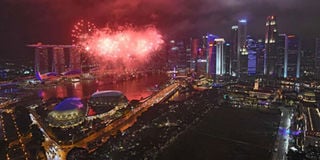Impact of a tumultuous 2017 will be felt beyond coming year

Fireworks burst over the skyline during an hourly display leading up to the final countdown for the New Year 2018 celebrations in Singapore on December 31, 2017. PHOTO | ROSLAN RAHMAN | AFP
What you need to know:
- The year started on a rather inauspicious note with the inauguration of Donald Trump as President of the United States.
- Another refugee crisis loomed in Myanmar, where thousands of Rohingyas have been forced to flee brutal attacks by government and other forces.
- On a more positive note, 2017 saw Kenya make history when the Supreme Court nullified the August 8 presidential election — a first for an African country.
- A transition of another kind took place in Zimbabwe, where 93-year-old President Robert Mugabe was quietly ousted by his own military without a single shot being fired.
Many would agree that 2017 was not a very good year for most people around the world.
The year started on a rather inauspicious note with the inauguration of Donald Trump as President of the United States. This unleashed uncertainty globally, mainly because the leader of the most powerful nation on earth is known to be narcissistic and unpredictable, qualities that have the potential to seriously (some would say, negatively) impact US domestic and foreign policies.
Trump promised to reverse all legislation passed under his predecessor Barack Obama — including his health policy, known as Obamacare. His anti-Muslim and anti-immigration stance emboldened White supremacists in America and generated an atmosphere of paranoia.
With a looming nuclear threat from North Korea, and a potential trade war between the US and China, it is it difficult to predict how Trump will react in the coming year.
Will 2018 see the unleashing of a nuclear war for the first time? How will a US trade war with China impact the global economy?
WAR
In 2017, another kind of war showed the first signs of coming to an end. In Iraq and Syria, the murderous Islamic State (IS) lost significant portions of its territory, though the jury is still out on whether this was due to the efforts of US-backed insurgents or the Iraqi military and Russia-backed Syrian forces.
Unfortunately, this did not reduce the threat of terrorism in other parts of the world. There were more IS-inspired ‘lone wolf’ terrorist attacks involving unconventional weapons, such as vans and trucks, in major cities.
In Somalia, attacks by the Al-Shabaab militants became more frequent and brutal. The October terrorist attack in Mogadishu that left more than 400 people dead and hundreds of others injured was the worst tragedy to befall the city in recent years.
Although this attack did not receive the global attention that others of its kind receive, its impact is likely to be felt in Somalia, particularly among the residents of Mogadishu, for a very long time.
REFUGEE CRISIS
Meanwhile, the refugee and migrant crises showed no signs of abating. Hundreds of people continued to drown in the Mediterranean Sea while, in Libya, human trafficking rings re-introduced another type of slavery in Africa by auctioning migrants and refugees in open markets.
Another refugee crisis loomed in Myanmar, where thousands of Rohingyas have been forced to flee brutal attacks by government and other forces.
The world watched in shock as this largely Buddhist country committed unspeakable atrocities under the leadership of Aung San Suu Kyi, who, ironically, is a recipient of the Nobel Prize for Peace.
On a more positive note, 2017 saw Kenya make history when the Supreme Court nullified the August 8 presidential election — a first for an African country.
The court decision was lauded worldwide for being courageous. However, the repeat election in October did not live up to expectation.
LEGITIMACY
With the main opposition candidate boycotting the election and at least half the electorate not showing up at polling stations, the predictable results failed to inspire or impress but raised serious questions regarding the legitimacy of President Uhuru Kenyatta’s government.
The question of legitimacy is likely to haunt the Jubilee government for the remainder of its tenure; which means Kenya’s political stability is likely to face more challenges in the coming months.
A transition of another kind took place in Zimbabwe, where 93-year-old President Robert Mugabe was quietly ousted by his own military without a single shot being fired.
This ‘coup that was not a coup’ stunned the world, particularly African dictators who have ambitions to rule indefinitely.
It is hard to tell whether his successor Emmerson Mnangagwa will bring about political and economic reforms that were eroded during Mugabe’s 37-year reign but the world — African presidents in particular — will be keenly watching.
SEXUAL HARASSMENT
In 2017, women’s rights got a boost from an unlikely source — Hollywood. Revelations that movie producer Harvey Weinstein had sexually harassed several women led to an avalanche of #MeToo exposés on social media, with women from all walks of life admitting to being sexually molested by their bosses or colleagues. Even the United Nations — that bastion of impunity — instituted a sexual harassment policy in response to the furore. Whether it will be effective or not is anyone’s guess.
May 2018 be less tumultuous and may wisdom and sanity prevail. Happy New Year!





